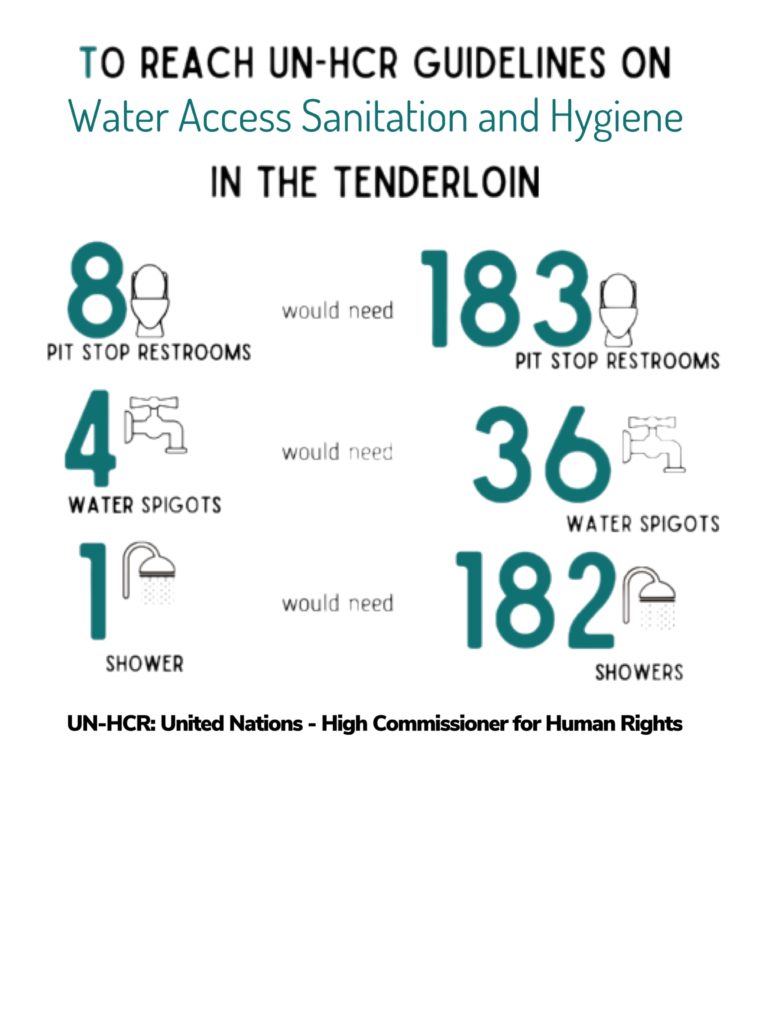The Water For All Initiative, a campaign led by the Human Rights Workgroup of the Coalition on Homelessness, is reacting to San Francisco’s continued failure to provide potable water and other basic human necessities, such as access to showers and bathrooms, for unhoused residents in the Tenderloin. The initiative demands more permanent drinkable water sources throughout the Tenderloin that are accessible to its unhoused and precariously housed residents.
As part of the initiative, the Human Rights Workgroup conducted a survey that polled around 80 unhoused individuals in the Tenderloin to assess their current water access – or lack thereof. The surveys found that 65% of the respondents are not able to access 15 liters of safe water a day, which is the United Nations international emergency water standard. By contrast, housed San Franciscans use an average of 159 liters, or 42 gallons, of water a day. The Coalition survey also found that 40% of respondents must travel over 30 minutes to access water. Thirty minutes’ round-trip travel is considered the standard for “basic access” to drinking water by the World Health Organization (WHO).

Beyond the sheer lack of water access points, many unhoused individuals deal with disabilities that impair their mobility. One survey participant said, “I have to make a commute to get water. How do I carry it around with disabilities?” Further, many have to worry about their belongings being stolen while they’re gone looking for water. “You can search for hours,” one respondent told the Coalition.
The survey results confirmed that San Francisco’s unhoused residents –which are internally displaced people in one of the wealthiest cities in the world– do not even have access to the lowest international standards for water and sanitation.
For the 3,659 unhoused residents of District 6 –which is nearly half of San Francisco’s unhoused population concentrated in one district– there are currently only four water spigots, and one shower available. To meet the Water, Sanitation, and Hygiene (WASH) standards established by the U.N. High Commissioner for Refugees, which mandate that no more than 100 people share one working water faucet, San Francisco would have to provide an additional 36 water assets in the Tenderloin alone to serve its unhoused residents appropriately.
In addition to there being far too few water access points, most are only temporary fixtures, such as the several fire hydrant spigots installed last year as part of the city’s COVID response. These fire hydrant spigots are far from ideal. To many unhoused residents that the Coalition has talked to while conducting the surveys, it seems unclear whether these spigots are safe and potable water sources, such as one person who said that they don’t even trust giving their dog that water to drink. Furthermore, the spigots sometimes get moved around the district, such that people cannot count on them for their daily water needs. The pandemic has made it even harder for unhoused folks to meet their basic water and hygiene needs. This is mostly because COVID restrictions have greatly reduced access to water in public places like schools, libraries, and parks. Being already more vulnerable due to the difficulty or impossibility of sheltering in place, this reduced water access has put unhoused San Franciscans at an even greater risk of contracting COVID, as not meeting one’s basic survival and sanitation needs is connected to a low immune response and the transmission of diseases.
The crisis-driven implementation of temporary water access points is not enough. Instead, an investment in permanent fixtures is necessary to provide a stable long-term solution. Importantly, these must be constructed in public spaces that are always accessible, rather than being made exclusive to certain people and limited to certain times. This would be a meaningful step away from further criminalizing homeless people, who are often affected by discriminating local statutes around sanitation.
While appreciating the recent establishment of permanent potable water assets in the Tenderloin, Mission and Bayview, the Coalition’s Human Rights Workgroup is demanding an additional three permanent water assets, in the form of water bottle filling stations with two spigots, in the Tenderloin, which would increase the total to six. Long term, the group is looking to expand its demands to other districts and potentially the entire city.
The group is arguing that such permanent water fixtures are not just necessary to help solve the public health crisis, but that they are also an investment in the public space and living conditions shared by all San Franciscans, who would benefit from freely accessible water throughout the city. The fixtures also serve the purpose of encouraging the use of refillable water bottles, reducing the reliance on disposable plastic water bottles by unhoused and housed San Franciscans alike.
The Initiative’s report capturing all the results from the water access survey and laying out its demands will be published in early March. And on World Water Day, Monday, March 22, the initiative will organize an action to raise public awareness around the lack of basic water access for San Francisco’s unhoused residents!

